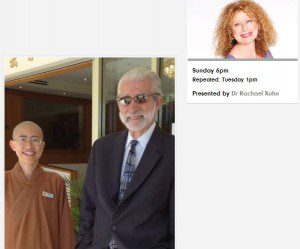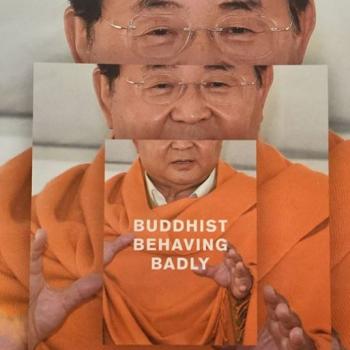The Australian Broadcasting Company (ABC), has a couple podcasts and articles this week on this topic:
The article surrounding the first begins:
At the heart of Buddhism is a metaphor for interconnectedness: Indra’s net. The Vedic god’s net, which is supposed to hang over his palace on Mount Meru, is said to stretch to infinity. At each point where the threads cross sits a jewel that reflects all the other jewels, and like mirrors within mirrors, the entire cosmos is reflected.
Lewis Lancaster, Professor Emeritus of Buddhism at the University of California at Berkeley, knows how apt that metaphor is in the current world. For years he’s struggled to find an adequate way of documenting the complicated, almost infinite spread of Buddhism from its 5th century BCE Indian origins. That is, until he found an equally complex instrument to map the ancient faith.
Prof. Lancaster’s project provides an amazing visual and current image of Buddhism as it is being practiced and has been practiced throughout time and around the world, the Electronic Cultural Atlas Initiative. He has been working for over a decade on compiling the data needed for this (not unlike the prolific work of Charles Muller, and others, to compile the Digital Dictionary of Buddhism).
If you haven’t seen it yet, Prof. Lancaster’s lecture 5 years ago in California gives a comprehensive overview of Buddhism and his work to make it better known:
Returning to the present, Lancaster was interviewed today for ABC by Dr Rachel Kohn to discuss the movement of Buddhism and how it became

the “first world religion.” As it spread, he suggests, it altered beliefs and practices where ever it when. It even likely influenced the ‘cults of relics‘ that would later develop widely throughout Christianity – though he notes that this is not a fact widely acknowledged (as far as he knows) by researchers in Christianity.
He also notes that Buddhists have never denied the reality of the world, never, contrary to a lot of what people continue to write about Buddhism today. As he says, the way that our mind comes into contact with that world is at the center of Buddhist analysis – “what we perceive is not the thing itself. What we perceive is partly what our cognition constructs for us.” No, Lancaster hasn’t been reading Kantian epistemology*, but yes, he is pointing out a striking similarity between Buddhist accounts of our relation to the world and that of the 18th century German philosopher.
It’s an excellent talk with a wonderfully well-versed Buddhist scholar. Ven. Jue Wei enters with her research toward the end of the interview. I highly recommend downloading/listening to the full talk.
* Here is a helpful review of a recent philosophy text on Kant’s Epistemology. And the book is here.
Read more:
- The Sociology of Early Buddhism by Greg Bailey and Ian Mabbett
- Theravada Buddhism: A Social History from Ancient Benares to Modern Colombo by Richard Gombrich
- The Spread of Buddhism by Ann Heirman and Stephan Peter Bumbacher (eds), and
- The Foundations of Buddhism, by Rupert Gethin











